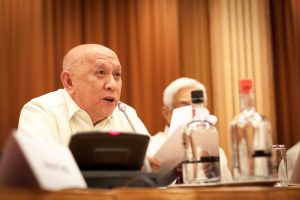Opening speech for the fourth round of talks in the GRP-NDFP peace negotiations
Noordwijk an Zee, The Netherlands 3 April 2017
By Fidel V. Agcaoili
Chairperson Negotiating Panel of the NDF
 Your Excellencies from the Royal Norwegian Government, specifically Special Envoy Ambassador Elisabeth Slattum and her team of facilitators,
Your Excellencies from the Royal Norwegian Government, specifically Special Envoy Ambassador Elisabeth Slattum and her team of facilitators,
Compatriots in The Netherlands and the Negotiating Panels and Delegations of the Government of the Republic of the Philippines (GRP) and the National Democratic Front of the Philippines (NDFP),
Esteemed guests,
I think it is significant to note that the fourth round of formal talks in the GRP-NDFP peace negotiations opens on the heels of the 48th founding anniversary of the New People’s Army (NPA). On March 29, just four days ago, the NPA, the armed force of the Communist Party of the Philippines (CPP), which is an allied organization of the NDFP, marked its 48th year of revolutionary armed struggle.
Today, we have new generations of Filipinos, spread across the country, taking up arms to address the same basic problems that have hounded our history as a people – poverty, inequity, injustice, oppression. The resilience of the NPA is as much a testament to the inexhaustible participation and support of the people as it is an indictment of the failure of the system and its successive governments to address the socio-economic roots of the armed conflict.
This is why the NDFP Negotiating Panel comes to this fourth round of formal talks determined as ever to push and accelerate the negotiations in the hopes of forging a comprehensive agreement on social and economic reforms by the end of 2017.
The NDFP’s chief political consultant, Prof. Jose Ma. Sison, has already raised key points of the Comprehensive Agreement on Social and Economic Reforms or the CASER in rela- tion to a roadmap for the peace process.
I share Professor Sison’s positive views and reiterate the wisdom of securing the approval of the CASER ahead of any bilateral ceasefire agreement, unless both agreements can be signed simultaneously. It is important to stress this as the issue of ceasefire should not be pursued as an end in itself.
Ceasefires, whether unilateral or bilateral, are just a means to an end. Its main purpose is to create conditions conducive to reaching agreements on basic re- forms that are satisfactory to both sides.
However, let me note that the NDFP rues the GRP’s sudden announcement not to restore its unilateral ceasefire, which is an unexpected departure from the March 11 backchannel agreement. Yet the NDF Negotiating Panel, in the spirit of flexibility and openness, desirous of fostering a positive climate for continuing the peace talks and building on the gains achieved in the last three rounds, is willing to discuss with its counterpart what kind of bilateral ceasefire agreement is desired by the GRP in place of the unilateral ceasefire.
The NDFP believes it is possible to have a bilateral ceasefire agreement that conforms to the position that simultaneous and reciprocal declarations of unilateral ceasefire can be agreed upon and bound by a Memorandum of Understanding that shall be issued at the end of the fourth round of formal talks.
We trust and hope that our counterparts in the GRP side will be as open and resolute in ad- dressing the long drawn-out issues concerning the implementation of an already existing agreement – the Comprehensive Agreement on Respect for Human Rights and International Humanitarian Law or CARHRIHL.
These outstanding issues concern the promised release of 19 ailing and elderly political prisoners; the continued detention of six NDFP consultants—four arrested under the Arroyo regime and two under the Duterte government; the unresolved cases of enforced disappearance and murder of JASIG-protected NDFP personnel during the Arroyo regime; escalating military operations that terrorize communities under the guise of peace and development projects of Oplan Bayanihan; human rights violations and lack of due process in the anti-drugs campaign; and the political rehabilitation of the Marcos family, among others.
In relation to escalating militarization in the countryside, 46 farmers have already been killed under the Duterte administration, according to the Kilusang Magbubukid ng Pilip- inas. Fifty percent of these killings were perpetrated following the Armed Forces of the Philippines’ implementation of an “all-out war” policy on February 2, or a rate of one farmer killed every two days.
On the other hand, the NDFP welcomes the progress made in the issue of compensation for victims of martial law and hopes that the process of indemnifying the victims can be further accelerated to ensure that justice is rendered to the victims.
Before I end, on behalf of the NDFP Panel, I sincerely thank the Royal Norwegian Govern- ment for its continuing and crucial support to the peace negotiations, especially as these took a difficult turn in the last two months. It was a wrenching experience for the NDFP consultants in the Philippines as they faced intensified harassment and imminent arrest, with one consultant actually being jailed. We commend the RNG for walking the extra mile to push the backchannel talks and put the peace process back on track.
Today, we welcome back arrested NDFP consultant Ariel Arbitrario into our fold, and we hope that no more such arbitrary incidents will recur to obstruct the advance of the peace process under the Duterte administration.
We look forward to fruitful discussions in the next four days in the common effort to find solutions to seal an enduring and just peace for our country through mutually acceptable comprehensive agreements on necessary reforms.
Thank you, and a good morning to all.
